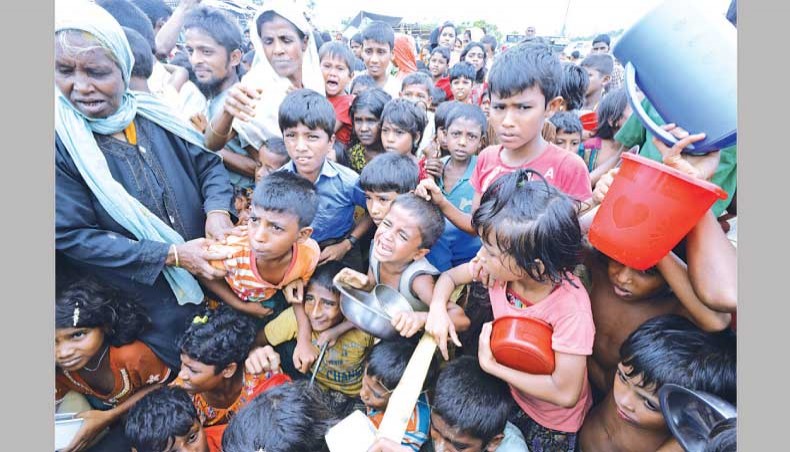Rohingya children at risk of abuse, trafficking
Thousands of Rohingya children entering Bangladesh to flee violence in Myanmar since August 25 are at the risk of exploitation, including sexual harassment, and trafficking amid developing malnourishment without and in absence of adequate protection.
UNICEF and Save the Children said that over half of the about 600,000 Rohingya new arrivals were children and they were living in the open, with food, safe water and sanitation in desperately short supply and the risk of waterborne and other diseases palpable.
The needs of vulnerable Rohingya children arriving in Bangladesh must be prioritised by the international community, said international aid providers. Adolescent girls, in particular, must be protected, as they are one of the groups most at risk of gender-based violence within the camps, they said.
Thousands of child new arrivals are suffering from traumatic stress with their memories of murder, rape and arson attack on their near and dear ones.
Save the Children International chief executive officer Helle Thorning-Schmidt on Saturday termed Rohingya crisis ‘children’s emergency’ and warned that many of the children could be victim of abuse and trafficking.
At a briefing in Dhaka, she said that the Rohingya crisis also was ‘a severe child protection crisis.’
Bangladesh so far found at least 18,624 Rohingya children who lost one or both parents. The number was three times higher than the primary estimation. UNICEF estimated 1,675 unaccompanied children separated from both parents and relatives.
Many of these children are traumatised which is causing disturbance to their mental growth, said UNICEF and clinical psychologists.
‘Like any other refugee condition these children are also exposed to high levels of violence, abuse and exploitation, including sexual harassment, child labour and child marriage, and are at high risk of being trafficked,’ UNICEF Bangladesh spokesperson AM Sakil Faizullah said.
Plan International country director Orla Murphy said, ‘For unaccompanied children – particularly girls – there is a very real risk of sexual violence.’
She said, ‘This is partly because the informal settlements that are being built fail to meet basic safety standards. The camps are overcrowded, there is no privacy, anyone from outside can wander in off the streets, and the shelters that are being constructed have no doors or locks.’
According to UN estimation on October 19, 5,89,000 Rohingyas entered Bangladesh in 54 days in the new influx what the United Nations called the world’s fastest-developing refugee emergency.
The influx began after Myanmar security forces responded to Arakan Rohingya Salvation Army’s reported attacks on August 25 by launching violence what the United Nations denounced as ethnic cleansing.
UNICEF and Save the Children estimated that about 60 per cent of the Rohingyas were children and 20 per cent children were under five of years of age.
‘This is children’s emergency,’ said Helle Thorning-Schmidt.
‘They [Rohingya children] have seen things in Myanmar that no children should ever see, they have experienced that no children should ever experience,’ she said, adding ‘even very small children are telling horrific stories of burnt villages and others atrocities.’
Helle Thorning-Schmidt, also former prime minister of Denmark, said that while visiting Rohingya camps in Cox’s Bazar she saw barefooted children everywhere caring their small siblings.
‘Children have been suffering from nightmare; they are hungry and malnourished, living in overcrowded position, is a breeding ground for diseases,’ she added.
‘We have seen that about 50,000 children are already malnourished,’ she said.
‘Children without families are at severe risk not only falling of ill but also of being abused and even trafficking,’ she said, urging, ‘we are looking at also a severe child protection crisis, we have to move in quickly.’
She also said that education for Rohingya children should be ensured. ‘Otherwise we will have taken away their future for twice, first letting them leaving their home and next by not giving them future.’
Desperate living conditions and waterborne diseases are threatening more than 320,000 Rohingya children, UNICEF said in a statement on Friday.
Almost 60 per cent of the latest arrivals are children, crossing at a rate of 1,200-1,800 per day.
In a report titled ‘Outcast and Desperate: Rohingya refugee children face a perilous future’, UNICEF said on Friday that most of the refugees were living in overcrowded and insanitary makeshift settlements. Despite an expanding international aid effort led by the government of Bangladesh, the essential needs of many children were not being met.
High levels of severe acute malnutrition among young children were found in the camps, and antenatal services to mothers and babies were lacking. Support for children traumatised by violence also needed to be expanded, said the report.
It said that in the chaotic setting of the camps, children and youths could fall prey to traffickers and others looking to exploit them.
Bangladesh social service department additional director Seyda Ferdous Akter said they found 18,624 Rohingya children who lost their parents or lost contact with them till Friday.
The department on September 20 started listing orphan Rohingya children and the state minister for social welfare Nuruzzaman Ahmed at a press conference in Dhaka on September 26 said that they had estimated about 6,000 such Rohingya children.
These vulnerable children were living a miserable life, as they were deprived of major source of a child’s emotional and physical security from parents, said Dhaka University clinical psychology professor Mahmudur Rahman.
‘Mental development of children living without parents, family and seeing such violence would not be proper,’ he said.
‘These children are now going through acute stress disorder and in the long run can develop post-traumatic stress disorder,’ he added.
News Courtesy: www.newagebd.net











